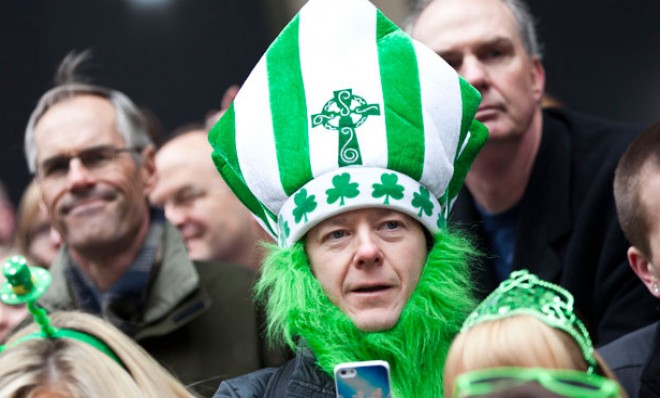8 fun facts about the Irish language
Happy St. Patrick's Day!


A free daily email with the biggest news stories of the day – and the best features from TheWeek.com
You are now subscribed
Your newsletter sign-up was successful
You may hear an "Erin go bragh" and a "sláinte" or two this St. Patrick's Day, but even on the most Irish of holidays, we don't hear much of the Irish language — which is a shame! Irish is so different from English or any of the languages we usually study in school, and so much about it is rather interesting and cool. Here are a few fun facts about Irish.
1. THE NAME OF THE LANGUAGE IS "IRISH"
Gaelige is the name of the language in Irish, and Irish is the name of the language in English. Sometimes people will call it Irish Gaelic in order to make sure they aren't misunderstood to mean "Irish English" for Irish. They may also say Irish Gaelic to distinguish it from Gaelic, which means Scottish Gaelic, a related but different language.
The Week
Escape your echo chamber. Get the facts behind the news, plus analysis from multiple perspectives.

Sign up for The Week's Free Newsletters
From our morning news briefing to a weekly Good News Newsletter, get the best of The Week delivered directly to your inbox.
From our morning news briefing to a weekly Good News Newsletter, get the best of The Week delivered directly to your inbox.
2. THERE'S NO "YES" OR "NO" IN IRISH
There are no words for "yes" or "no" in Irish, but that doesn't mean there's no way to answer a question. You communicate "yes" and "no" with a verb form. The answer to "did they sell the house?" would be "(they) sold " or "(they) didn't sell." In Irish:
Ar dhíol sian an teach?Dhíol.Níor dhíol.
3. ITS WORD ORDER IS VERB SUBJECT OBJECT
Sentences have verb-subject-object order. So "I saw a bird" would be "Saw I a bird." "I always speak Irish" would be "Speak I Irish always." This word order is relatively rare — only 9 percent of the world's languages use it.
A free daily email with the biggest news stories of the day – and the best features from TheWeek.com
4. THE WORDS FOR NUMBERS DEPEND ON WHETHER YOU'RE COUNTING HUMANS OR NON-HUMANS
In addition to one set of numbers for doing arithmetic or referring to dates and times, Irish has a second set for counting humans and a third set for counting non-humans. Five children is "cúigear páiste," but five horses is "cúig chapall."
5. THE BEGINNING OF THE WORD CHANGES DEPENDING ON THE GRAMMATICAL ENVIRONMENT
What's the word for "woman"? Either "bean" (byan), "bhean" (vyan), or "mbean" (myan), depending whether it comes after certain possessive pronouns (my, your, his), or certain prepositions (under, before, on), or certain numbers, or a whole range of other conditions that determine which form of the word is correct. Most languages people study require them to learn different word endings, not beginnings. Irish requires…both. It's a bit of a challenge!
6. IT ONLY HAS 11 IRREGULAR VERBS, THOUGH
English has a lot more. More than 80, and that's just counting the commonly used ones…
7. IT'S LEFT AN IMPRINT ON THE ENGLISH SPOKEN IN IRELAND
English phrases in many parts of Ireland show a parallel structure with their counterparts in Irish. "I'm after eating my breakfast " (I just ate my breakfast), "I gave out about the terrible service" (I complained/told them off about the terrible service), and in some places, "He does be working every day."
8. IT'S POSSIBLE (BUT NOT EASY) TO TRAVEL AROUND IRELAND ONLY SPEAKING IRISH
Filmmaker and native Irish speaker Manchán Magan made a documentary No Béarla (No English) in which he traveled through Ireland only speaking Irish, even when people demanded he switch to English. Shopkeepers told him to get lost, officials refused to help him, people on the street ignored him, but he kept at it and found willing speakers here and there. In any case, he survived the trip. Watch it here.
Arika Okrent is editor-at-large at TheWeek.com and a frequent contributor to Mental Floss. She is the author of In the Land of Invented Languages, a history of the attempt to build a better language. She holds a doctorate in linguistics and a first-level certification in Klingon. Follow her on Twitter.
-
 The Olympic timekeepers keeping the Games on track
The Olympic timekeepers keeping the Games on trackUnder the Radar Swiss watchmaking giant Omega has been at the finish line of every Olympic Games for nearly 100 years
-
 Will increasing tensions with Iran boil over into war?
Will increasing tensions with Iran boil over into war?Today’s Big Question President Donald Trump has recently been threatening the country
-
 Corruption: The spy sheikh and the president
Corruption: The spy sheikh and the presidentFeature Trump is at the center of another scandal
